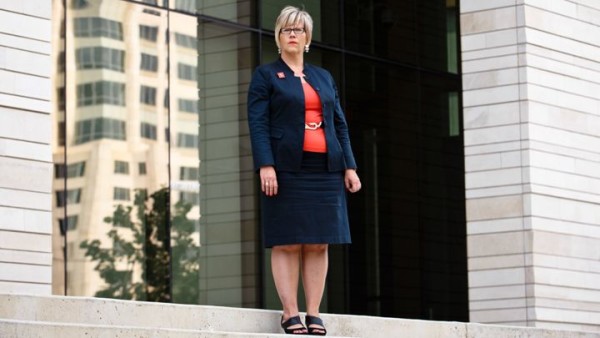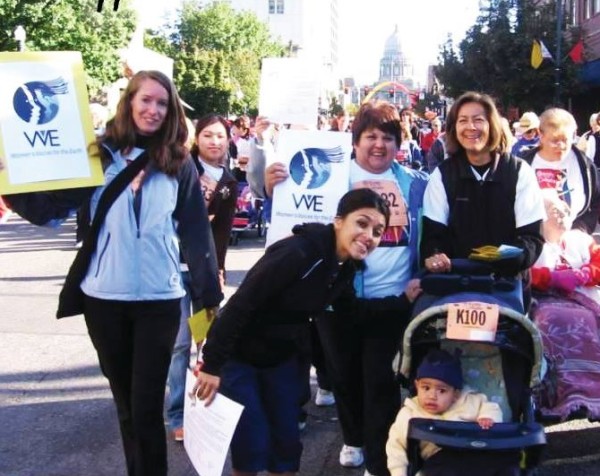The actions of women have undoubtedly influenced history just as much as those of men. But most history books tell a different story. The contributions of women are often relegated to the sidelines, or omitted altogether, while cis-gendered, hetero, white men remain at the forefront.
This imbalance is exactly why a group of U.S. feminists in 1978 kicked off a campaign to revise school curriculum in California, starting with creating a “Women’s History Week,” according to the Women’s History Project. Within just two short years, Women’s History Week spread across the country. It picked up enough steam that organizers successfully lobbied Congress and President Jimmy Carter to make the week go national; the first national Women’s History Week started on March 2, 1980. After the urging of the Women’s History Project, then President Reagan issued a proclamation establishing March as Women’s History Month. And the rest is herstory.
Well, sort of. There’s still a lot of work to do. And women across the country are continuing to wage fights against injustice wherever it rears its head – and that’s a lot of places. As Women’s History Month comes to a close, check out some of the activists and organizations that are making history for women today:
Alicia Garza, Patrisse Cullors, and Opal Tometi are at the forefront of today’s fight for racial justice. What started as outrage over deaths of unarmed black people at the hands of law enforcement has transformed into “the birth of a new civil rights movement” which, as Alicia Garza has said “is a call to action to make sure we are creating a world where black lives actually do matter.”
The historic moments already achieved by the #BlackLivesMatter movement are vast, including, most recently, the ousting of Anita Alvarez, Chicago’s top prosecutor who has a track record of mishandling cases involving police brutality and allowed miscarriages of justice against men and women of color in Chicago. The New York Times summed up Kim Foxx’s victory over Alvarez in the headline of a recent editorial, Voters tell Prosecutors, Black Lives Matter. Additionally, at the urging of the #BlackLivesMatter movement, both Democratic candidates have released racial justice platforms, which include extensive criminal justice reform plans. But as leaders from the movement have stated, they are not going to support any candidate and instead plan to focus on continued political activism by confronting elected officials about the treatment of people of color across the country.
It’s not surprising that Fortune just named Alicia Garza, Patrisse Cullors, and Opal Tometi among the world’s greatest leaders.
(Photo credit: Cosmopolitan)
2. Amy Hagstrom Miller, the CEO of Whole Women’s Health

Amy Hagstrom Miller, the CEO of Whole Women’s Health, a health and abortion clinic in Texas, decided to fight HB-2 – the same law filibustered by Wendy Davis in 2013 – because she thinks it’s overly-restrictive, both on abortion clinics and women. Today, Whole Women’s Health is the lead plaintiff in the potentially ground-breaking abortion case in front of the Supreme Court. Since the passage of HB-2 in Texas, the number of abortion clinics in Texas has shrunk by half.
Although supporters of the restrictive regulations say they are to protect women’s health, Hagstom Miller sees it another way: “Just by design, these laws were written to break down access to abortion care.” And what happens in Texas, matters to the whole country because, Hagstom Miller points out in this interview with Rolling Stone, “what’s happening in Texas won’t stay in Texas.” In fact, she states, “the number of anti-abortion laws and restrictions and regulations that have passed in the last few years across the United States is unprecedented. Hundreds of restrictions have been introduced.” If the Supreme Court decides in favor of Whole Women’s Health, abortion and other forms of reproductive care, although currently legally protected in theory, will have to be practically accessible as well and will change the lives of millions of women across the country.
Check out this interview with Amy Hagstrom Miller here.
(Photo credit: Rolling Stone)
3. Women’s Voices for the Earth

This organization was founded by women who were tired of having their viewpoints shut out from male-dominated spaces across the environmental movement. Today, Women’s Voices for the Earth (WVE) is one of the leading organizations advocating for increased transparency in the cosmetics and feminine care industries. Not only do the industries use a plethora of chemicals that are harmful to the environment – to date, the E.U. has banned over 13,000 harmful cosmetics chemicals, many of which are known or likely carcinogens, while the U.S. has banned or restricted only 13 – but because the U.S. Food and Drug Administration’s (FDA) ability to regulate the cosmetics industry is unbelievably lax, women are exposed to tons of harmful ingredients in everything from nail polish to tampons.
That’s why WVE’s recent campaign, “Detox the Box,” focused on getting Procter and Gamble, one of the world’s largest manufacturers of feminine care products, to at least disclose the ingredients used in their products. After thousands of signatures on various petitions, and a rally outside of the Procter and Gamble’s annual shareholder meeting in October of 2015, the company agreed to release its ingredients – setting a major standard for the multi-billion dollar cosmetics industry.
But WVE’s campaigning goes beyond taking on global cosmetics companies directly. It’s part of a coalition leading efforts to pass historic federal legislation which would give the FDA broader oversight, including the authority to force recalls of dangerous products and require that companies report health hazards. If passed, this would be first update to federal cosmetics regulations since 1938, according to the New York Times. If the bipartisan bill passes and becomes law, it will change how some of today’s largest corporations do business – definitely a historic moment.
Until then, stay up to date with WVE’s work here and check out this app Skin Deep, which rates cosmetics based on their ingredients.
(Photo credit: Women’s Voices for the Earth)
These women are just a tiny sampling of all the amazing women in the U.S. – and across the world – that are making history right now. It’s exciting to imagine the types of women we’ll be celebrating in the Women’s History Month of 2066 or 2116. Hopefully, Women’s History Month will continue to grow and help ensure that women have their rightful place in our history books.